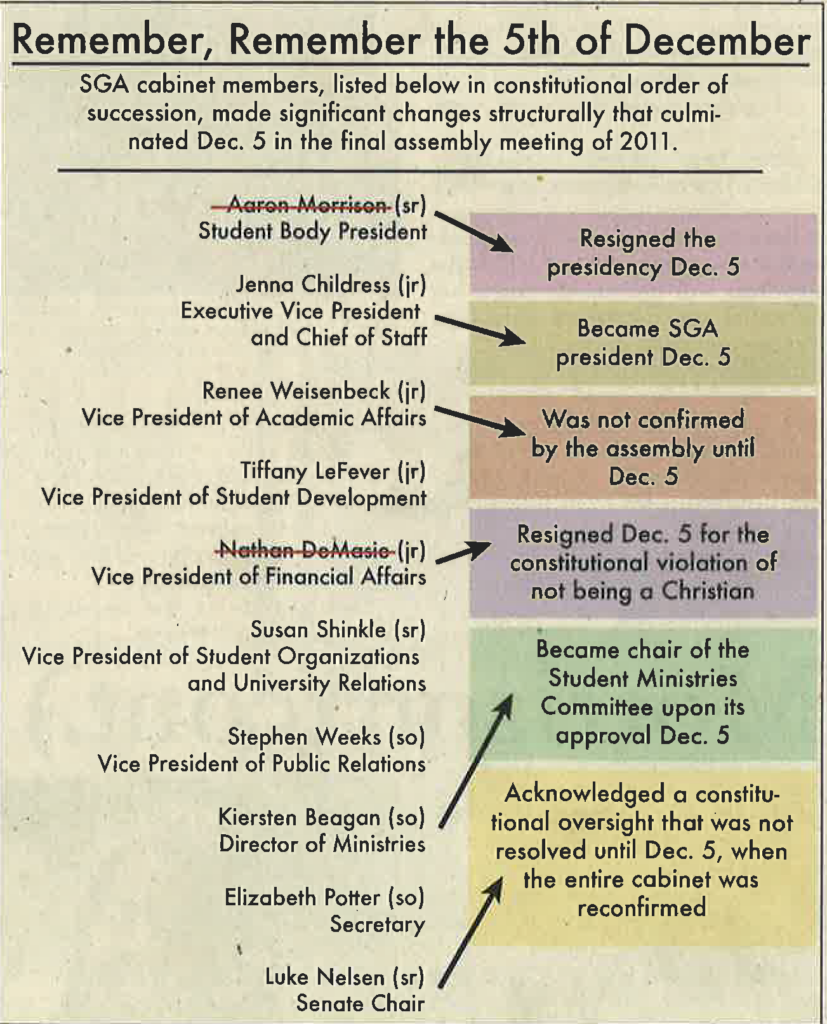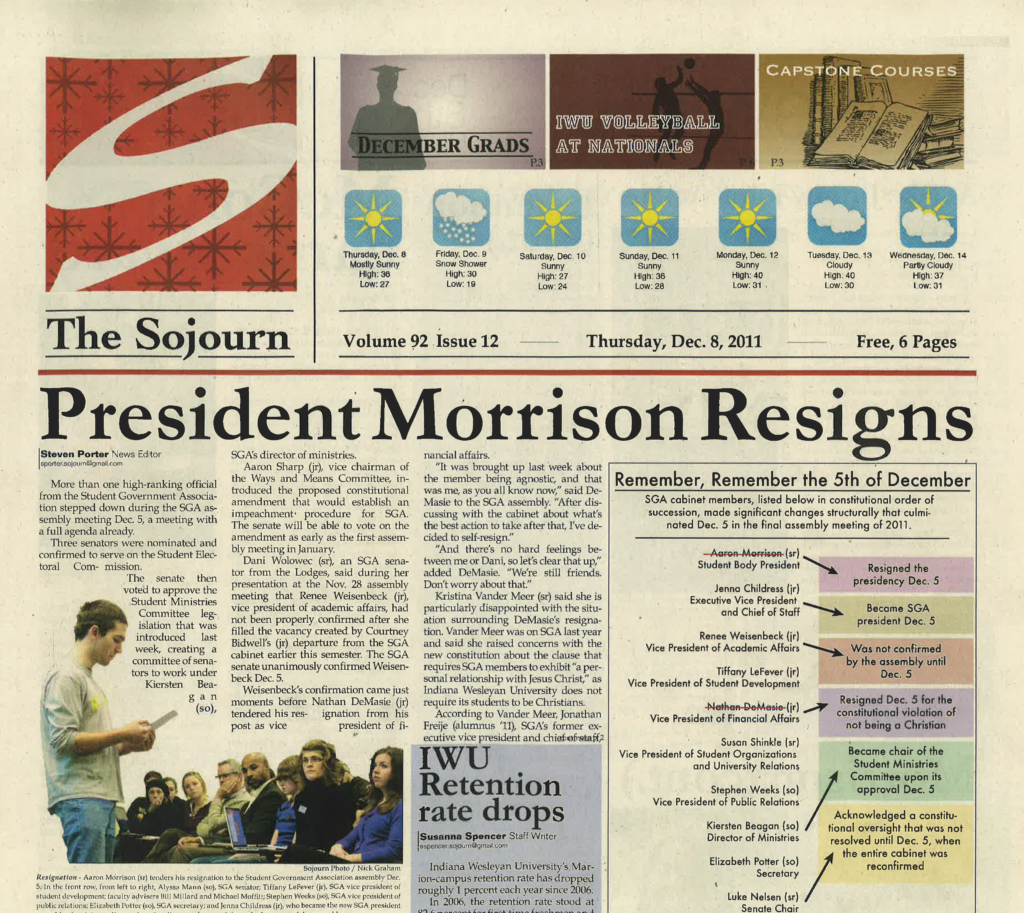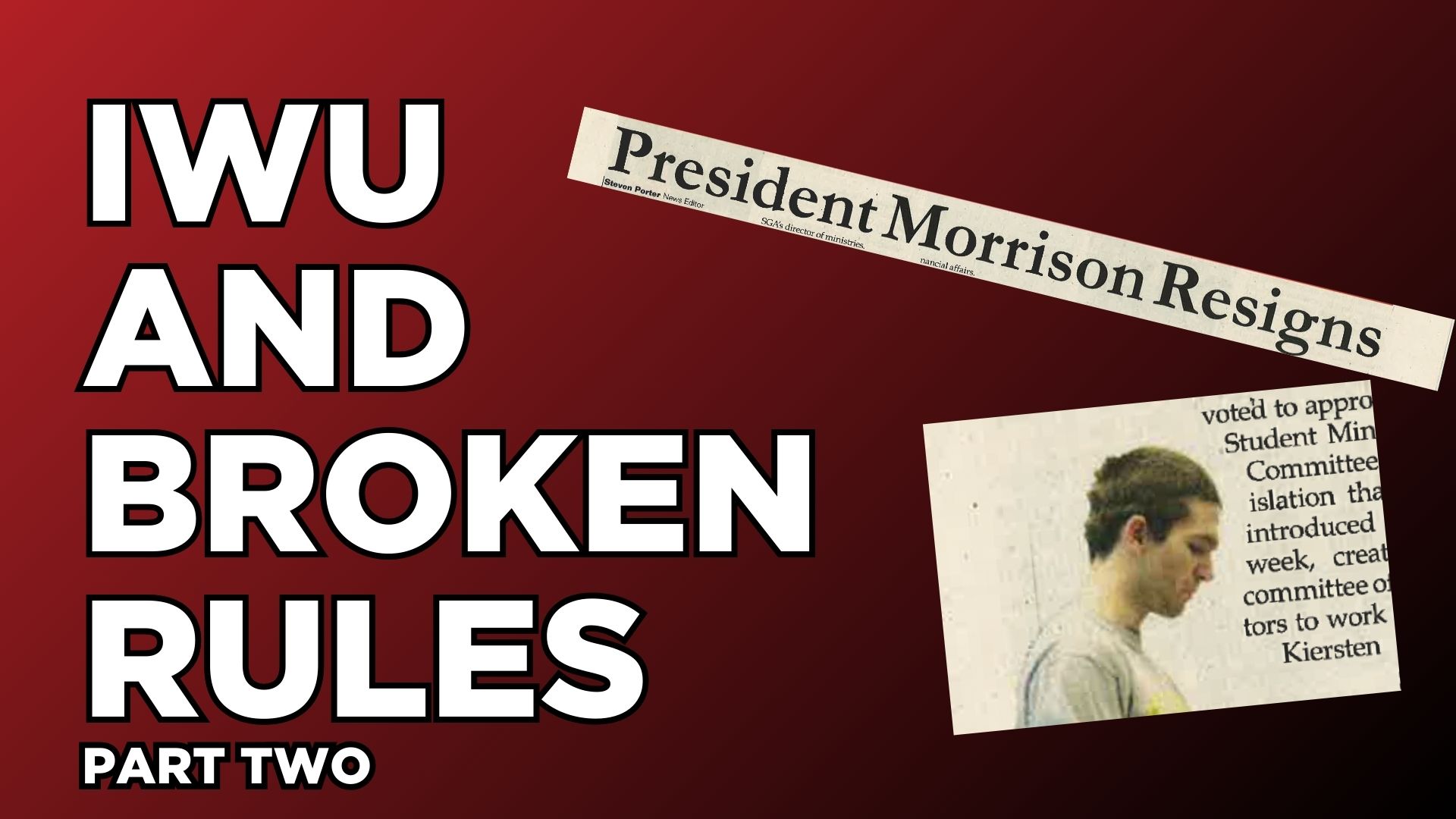The story continues…
THE ROOM WHERE IT HAPPENED
48 hours after that emergency cabinet meeting, the SGA Advisors came in to mediate the situation.
“The meeting was very tense. I think a lot of people very much had their minds set coming into that meeting, minds were not being changed,” Stephen Weeks said.
Bill Millard sat in with the cabinet and decided to put the issue of Aaron Morrison’s resignation to a vote.
“In that meeting, opinions and feelings are being expressed. The cabinet was expressing how they had felt and why they wanted him removed, not should we remove him,” Weeks said. “That’s how it felt to me. I cannot speak for what’s going on in the rest of the cabinet’s minds, but that is what it felt like to me.”
All but one from Morrison’s cabinet voted to have Morrison resign. After that vote, Millard and Michael Moffit took Morrison aside to talk with him privately.
“I was not going to resign. I said, ‘I have done nothing wrong, and I refuse to resign because I have broken the Constitution on this technicality of not selecting a Christian for my cabinet,’” Morrison said.
Morrison said there is a clause in which the Vice President of Student Development can remove a student leader from their position in the most extreme of circumstances.
“Moffitt and Millard told me, like, hey, you need to resign or you’re going to be fired, essentially, by the VP of Student Development,” Morrison said. “At that point, I was like, ‘Okay, I’m done. I can’t do anything further to fight this. I have no other recourse.’”
While Morrison was meeting with Moffit and Millard, the rest of the cabinet was alone in the original meeting room.
“I don’t remember much from it. I just remember being like, really, really bummed, because, like, I said, I knew where this was going. And I don’t really remember much about exactly what the conversation was or if there even was much of one once he left. I just know that if it felt bad in the room,” Weeks said.
IN THE MOST EXTREME CIRCUMSTANCES
“And what transpired was probably the most difficult 72 hours of my life up to that point,” Morrison said.
Shortly after the verdict from Moffit, Millard, and the majority of the cabinet, a friend of Morrison’s suggested he get off campus and think.
“I walked around the streets of Indianapolis knowing that I was going to have to resign. And I struggled with suicidal ideation for the first time in my life,” Morrison said. “It was very dark. I had a lot of very dark thoughts about wanting to get out of my situation in whatever way possible,”
There were a few key people who did help Morrison through this situation. Bud Bence, who was a professor of church history at IWU circa 2011, helped Morrison write his resignation letter. Brandon Hill, the VP of residence life, offered to let Morrison stay with him for the rest of the semester.
RESIGNATION
The December 5, 2011, SGA meeting came. Morrison went to the front and read his resignation letter. In that meeting, DeMaise also resigned due to the SGA constitutional rule of each cabinet member needed to be an expressed Christian.
“I didn’t agree with that rule. And you know of any rule that’s going to be like a deal breaker, like this, President has to go. You cannot break a rule like that. Just having someone on their cabinet who’s not an express Christian doesn’t seem like that’s a deal-breaking,” Weeks said.
Jenna Childress, Morrison’s Vice President, was signed in as SGA President in that meeting.
After Morrison read his letter, he left the meeting and did not return to campus until the spring semester.
“I just remember thinking it was an incredibly un-Christ-like thing to do. It was just cruel, like, we’re really gonna out [Nathan DeMasie] in front of, like, at the meeting.” Weeks said. “I just remember thinking like, wow, he isn’t a Christian, and we just gave him zero reasons to become a Christian by being cruel and indifferent rule followers.”

A SLIGHT RETURN TO THE STATUS QUO
After Morrison’s departure, SGA went through some changes.
“I think what really happened was there was a bit more of a strict adhesion to certain rules, like having quorum before meetings, and taking quorum recording it,” Weeks said. “There was just a bit more of a by-the-book approach.”
Weeks said that SGA is supposed to be a voice for the student body. However, the ability of SGA to make changes on behalf of the students is not easy.
LESSONS LEARNED
“In so many ways, like this was just like a microcosm of, like, of the real world, you know, and the politics that were going everything you just described, like, we see that in federal level and local level politics,” Lauren Sawyer said.
For a few years after Occupy Wildcat and Morrison’s resignation, there was a larger shift in the relationship between IWU’s students and the administration.
“What Aaron did with Occupy Wildcat was create a type of healthy tension that then existed between SGA and the administration in the years thereafter, until, I think a few years after I had left, that tension had kind of dissolved,” Timothy Scurlock said. “The type of working relationship that existed prior to Morrison being there resumed. But for a step, it was a very adversarial relationship.”
Morrison said that he wanted to return to a more radical philosophy for SGA, by giving students power to affect decisions that most impact them.
“I would say what that has taught me is that you have to bring people along with you as you’re going about pursuing collective change. Because if you get too far ahead, you can end up damaging your cause as a whole,” Morrison said.



